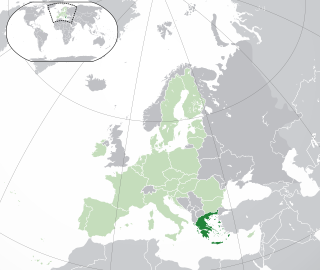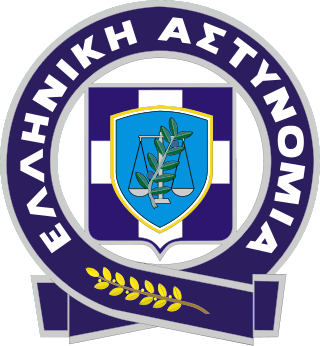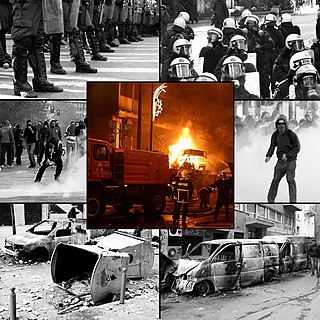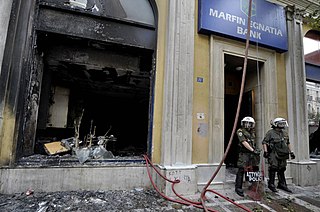
Revolutionary Organization 17 November, also known as 17N or the 17 November Group, was a Greek Marxist–Leninist urban guerrilla organization. Formed in 1975 and led by Alexandros Giotopoulos, 17N conducted an extensive urban guerrilla campaign of left-wing violence against the Greek state, banks, and businesses. The organization committed 103 known armed robberies, assassinations, and bombing attacks, during which 23 people were killed.

The Popular Association – Golden Dawn, usually shortened to Golden Dawn, is a far-right neo-Nazi ultranationalist criminal organisation and former political party in Greece. Golden Dawn rose to prominence during Greece's financial crisis of 2009, becoming the third most popular party in the Greek parliament in the January 2015 election. Its support since plunged, and it failed to enter parliament in the 2019 election. The criminal trial against the leaders, frequently described as the largest trial of Nazis since the Nuremberg trials, lasted more than five years.

Korydallos Prison Complex is Greece's largest jail and contains the country's main maximum-security prison, housing both maximum-security men and women. It is located in Korydallos, Piraeus. Famous detainees include members of the anarchist urban guerrilla organizations Revolutionary Organization 17 November, Revolutionary Struggle and Conspiracy of Fire Nuclei. Korydallos prison was also used as the place for the Greek junta trials in 1975, and contains a special court in its basement.

Lesbian, gay, bisexual, transgender, and queer (LGBTQ) rights in Greece are regarded as the most advanced in Southeast Europe and among all the neighboring countries. Public opinion on homosexuality in Greece is generally regarded as culturally liberal, with civil partnerships being legally recognised since 2015 and same-sex marriage since 16 February 2024.
Human rights in Greece are observed by various organizations. The country is a signatory to the European Convention on Human Rights, the Geneva Convention relating to the Status of Refugees and the United Nations Convention Against Torture. The Greek constitution also guarantees fundamental human rights to all Greek citizens.
Anarchism in Greece traces its roots to ancient Greece but was formed as a political movement during the 19th century. It was in the ancient era that the first libertarian thoughts appeared when philosophers based on rationality questioned the fundamentals of tradition. Modern anarchism in Greece emerged in the 19th century, heavily influenced by the contemporary European classical anarchism. Because of the Bolshevik success in the Russian Revolution of 1917 and the rise of the Communist Party, anarchism faded after the first decades of the 20th century. The collapse of the military junta put an end to the monopoly of the political power from the Right, whereas the dissolution of the Soviet Union diminished the allure of the Communist Party of Greece allowing anarchist groups to gain pace in Athens and other cities.

The Hellenic Police is the national police service and one of the three security forces of Greece. It is a large agency with responsibilities ranging from road traffic control to counter-terrorism. Police Lieutenant General Dimitrios Mallios is Chief of the Hellenic Police. He replaced Lazaros Mavropoulos. The Hellenic Police force was established in 1984 under Law 1481/1-10-1984 as the result of the fusion of the Gendarmerie and the Cities Police forces.

The 2008 Greek rebellion started on 6 December 2008, when Alexandros Grigoropoulos, a 15-year-old Greek student, was killed by a special officer in Exarcheia district of central Athens. The killing of the young student by police resulted in large protests and demonstrations, which escalated to widespread rioting, with numerous rioters damaging property and engaging riot police with Molotov cocktails, stones and other objects. Demonstrations and rioting soon spread to several other cities, including Thessaloniki, the country's second-largest city, and international cities in solidarity. Newspaper Kathimerini called the rioting "the worst Greece has seen since the restoration of democracy in 1974".

The Athens Polytechnic uprising occurred in November 1973 as a massive student demonstration of popular rejection of the Greek military junta of 1967–1974. It began on 14 November 1973, escalated to an open anti-junta revolt, and ended in bloodshed in the early morning of 17 November after a series of events starting with a tank crashing through the gates of the Athens Polytechnic. It is believed that approximately 40 people were killed by the Greek army on that day, and more than 2,000 were injured. This was the first event in a series of political crises that ultimately led to the fall of the junta in the summer of 1974, just a few months later.
The murder of Gramoz Palushi took place on September 4, 2004, at Tsilivi village in Zakynthos, Greece, when the 20-year-old Albanian Gramoz Palushi, who was celebrating the victory of the Albania national football team against the Greece national football team, was killed by a drunk Greek during a fight that broke out after the match.

Leianokladi railway station is a railway station situated between Lamia and Leianokladi in Phthiotis, Greece. The station opened on 8 March 1904 It is situated at the junction of the main Athens-Thessaloniki line with the branch line to Lamia and Stylida. It is served by intercity trains between Athens and Thessaloniki and by local trains to Stylida.

Gate 9 is a Cypriot Ultras group that supports PAC Omonia 29M and the non-football departments of AC Omonia.

Maria Elena Kyriakou is a Greek-Cypriot singer best known for winning the first season of The Voice of Greece under the mentorship of Despina Vandi. She represented Greece in the Eurovision Song Contest 2015 with her song "One Last Breath".
Ioanna-Maria Gertsou is a representative of the Greek guide dog movement, through "Lara Guide-Dog School" a non - profit organisation that she co-founded in 2008. She is visually impaired due to retinopathy of prematurity. She is mostly known as "Lara" is the first guide dog related organisation of Greece. She is an activist, promoting human diversity, guide dog access, physical and electronic accessibility and animal rights.

The anti-austerity movement in Greece involved a series of demonstrations and general strikes that took place across the country. The events, which began on 5 May 2010, were provoked by plans to cut public spending and raise taxes as austerity measures in exchange for a €110 billion bail-out, aimed at solving the Greek government-debt crisis. Three people were killed on 5 May in one of the largest demonstrations in Greece since 1973.
Arete Kosmidou is a Greek singer. She participated in the television show "The Voice of Greece" in 2014, finishing as a runner-up.
Events in the year 2021 in Greece.
The 2004 Greek Cup final was the 60th final of the Greek Cup. The match took place on 8 May 2004 at Nea Smyrni Stadium. The contesting teams were Panathinaikos and Olympiacos. It was Panathinaikos' twenty sixth Greek Cup final in their 96 years of existence and Olympiacos' thirtieth Greek Cup final in their 79-year history. The final was originally scheduled to take place at the Pampeloponnisiako Stadium in Patras, but at the last minute the approval for its performance was not given after the refusal of the Achaia Police Department, for fear of provoking incidents by the fans of both teams and even a few months before the Olympic Games, and Patras was among the Olympic cities. Finally, following recommendations from the Minister of Public Order, George Voulgarakis, that the final should be held within the Attica Basin for the best possible policing, it was decided to take place at the Nea Smyrni Stadium, as the Olympic Stadium, due to upcoming games, was in the final phase of its reconstruction. Initially, the mayor of Nea Smyrni and president of the amateur Panionios, George Koutelakis, expressed his opposition and refusal to concede the stadium and for security reasons the number of tickets available for sale was limited.

The arson of a branch of the Marfin-Egnatia bank in Athens took place on May 5, 2010, during anti-austerity demonstrations. A group of unidentified perpetrators threw molotov cocktails to the bank while 25–30 clerks were inside. Most of the employees managed to escape from the building or they were rescued by firefighters. However 3 people were trapped inside the building and died from asphyxia. In 2013, bank officials were convicted for the negligent homicide of three employees, the bodily harm of another 21 employees, and multiple failures in fire safety measures and staff training.

On 28 February 2023, a head-on collision occurred between two trains south of the Tempe Valley in Greece, about halfway between the Greek villages of Tempi and Evangelismos in the Thessaly region. The collision, involving the InterCity 62 (IC62) passenger train and an intermodal freight train, killed at least 57 people, with an official number of 342 passengers and 10 onboard railway staff on the passenger train and 2 staff on the freight train totalling 354 people on both trains. It is the deadliest rail disaster in Greek history. It was discovered that the IC62 passenger train had been allowed to proceed on the wrong track and pass signals at danger despite the presence of the freight train on the same stretch of track.













